#golden jubilee of bangladesh liberation war of 1971
Text
50th anniversary of Bangladesh 🇧🇩

#travelwithramim#victory#Bangladesh 🇧🇩#war#golden jubilee of bangladesh liberation war of 1971#1971 war#liberationwarofbangladesh#beautiful bangladesh
1 note
·
View note
Photo
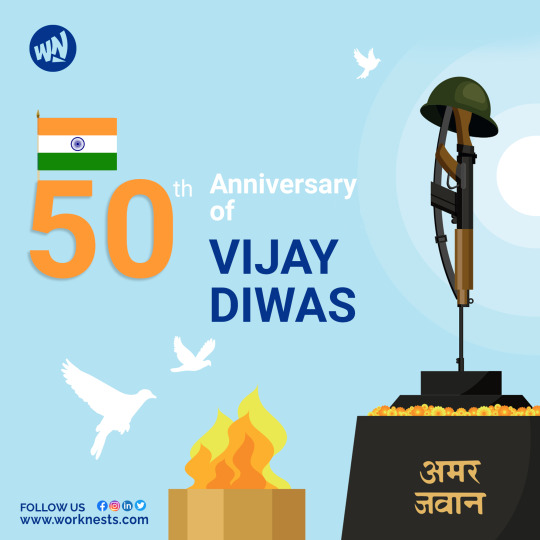
Wishing all a Happy & Proud Vijay Diwas. On this day in 1971, the Indian Army made the Pakistan Army surrender in East Pakistan and paved the way for Bangladesh to become a free Nation.
Let's Honor those Bravehearts who sacrificed their lives, for our bright future.
#golden jubilee of bangladesh liberation war of 1971#coworkingspaces#coworking#indianarmy#vijaydiwas#indian army#sharedoffice#worknests#shared office space
0 notes
Text
আমার সোনার বাংলা , আমি তোমায় ভালোবাসি ॥
🇧🇩💞🇧🇩
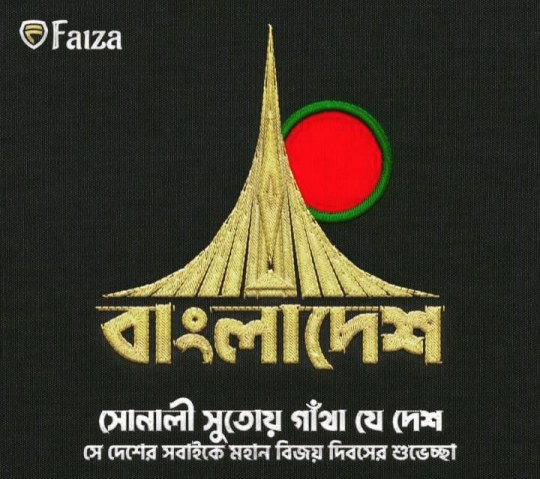
#bangladesh#victory#golden jubilee of bangladesh liberation war of 1971#motherlandedit#bangla tigers#bangel#tiger global
0 notes
Text
BOOK
Birth of Bangladesh
A concise chronicle of the independence struggle & The Genocide
Imran Chowdhury B.E.M.
‘’ 16th December is knocking at the door to cross the Golden Jubilee of the Birth of Bangladesh. The country will embark soon on the road to prosperity to march ahead with an aspiration to reach for the centenary. Long before the centenary comes, the Liberation War generation will be perhaps gone by then. But today, many who are in their teens, in their thirties or even in their forties are slowly and gradually being clouded with the events leading to the Birth of Bangladesh in 1971. There were a series of protracted movements, brainwashing, campaigns, and propaganda to water down the ferocity, bloodbath, betrayal, sacrifices, and Genocide that the nation had to endure to achieve independence or the Birth of Bangladesh. I was an eleven-year-old refugee during the War of Liberation have seen these all with my own eyes. And here I am today trying to remind today's generation what kind of heavy price their ancestors have had to pay at the altar of the Birth of Bangladesh; to have an Independent country - looking through the prism of the events of 1971. ‘’
Bangladesh has come a long way from those tumultuous days of 1971 and before. Since then, many muds, sediments, and waters have rolled down the green valleys, rivers, gorges, nullahs and haors of Bangladesh. No matter how hard those betrayers and their cronies have tried to eradicate the pains, memories and heartburn, yet they have failed miserably. The present generation treasures the legacy of the sacrifices of their ancestors. They do that with a very sad and heavy heart. Language Day, Independence Day, and Victory Day reverberate in their hearts and minds all the time, and they crave paying homage, celebrating and singing those epic songs and poems of patriotism. However, the diaspora communities 4th and 5th generations are passing through a crucial juncture of erosion of losing their ancestral Bangla vocabulary and literacy.
But, let me remind them all, No matter who says otherwise - ''1971 was the Golden Hour of the Bengali race's four thousand years of existence.'' Only a handful of countries in the world had to what we had to to be an independent country. Hardly any country in the world had to sacrifice such magnitude of price like us. We have perhaps paid the highest in that bloody war of our independence; in terms of killing, rapes, ethnic cleansing, crimes against humanity, Genocide and losing all our relics, riches and infrastructure.
The story goes back a long way away. The partition of 1947 and our half-witted leadership endangered our lives in the bondage of flimsy religious string to form a country when the other part of the jigsaw was full of racism and hate deep down in their minds and hearts. The Muslim Panjabis and the Muslim Pathan and the army was looking down upon us from the outset. To them, we were black Bengalis, we were small in height, we ate fish and rice, and we smelled, and we were not a martial race either. Yet foolishly went into a marriage of convenience with those heinous haters, to begin with.
The percussion and regain of oppression against us started as soon as we signed that hidden undeclared unspoken covenant of a neo-slavery; First, they gagged our voice with declaring war against our mother tongue - they wanted us forcefully speak in a different alien language Urdu as our official language. The first of many more avalanches of suppression and colonial aggression starts to sip into the midst of the lives of an East Pakistani.
They started stealing our produces, encash all our exports proceeds, expanded all developments on the west with a measly token of a few buildings for us—the disparity in jobs and employment and in the military. The rise of Bengali nationalism starts to perpetuate, foment and ferment slowly and gradually for the next 24 years.
One by one, the heinous Pakistani Muslim Punjabi and Pathan army started capturing all the cities, towns, ports, thana towns, municipalities, unions and even up to villages. Our mother, Bengal's brave and hero sons, did not sit idle on the face of that avalanches of bullets, cannon shells, and burst fires of their machine guns. The East Bengal Regiment, The East Pakistan Rifles, Police, Ansar, Mujahid, Students, mass population Political Parties all joined in unison to repulse the siege except those ideologically leaning towards radical right-wing religious biased schools of thought.
The rise of Bengali unity cemented over the hours, and that was perhaps the best hour in the history of the Bengali race. Revolts by the regular forces, paramilitary forces, border security forces, auxiliary forces, the student the general public sprang out of nowhere within hours and days. Joydevpur, Chittagong, B. Baria, Shamsher Nagar, Chuadanga, Jessore, Dinajpur started revolts and repulsions. People from all walks of life joined with their single barrel and double barrel shotguns, .22 bore shooting rifles, personal pistols, revolvers, knives, swords, ramda, bows and arrows, lances, spades, shovels, lancers made of bamboos. Just anything lethal could inflict harm to those heinous, barbaric Pakistani army. The ferocity and speed of the invaders were overwhelming for the resistance movement yet the golden sons of Bengal did not flinch an eyelid of fear.
Meanwhile, on the other side of the spectrum, mass killings, rapes, and arsons continued from town after towns, ports after ports, and villages. Continuous 24 hours round the clock curfew were promulgated and with a hour or two beaks in between. Million city and town dwellers evacuated and fled their town with only their lives, leaving every valuable behind. People fled with their families and kids to save their souls from the slaughters. The seven and a half million Bengalis are under siege by those Butchers; The Commander of the Pakistani Army Lieutenant General Tikka unleashed OPERATION JACKPOT; the man himself was known as the Butcher of Bengal whose directives of the operational order was, ‘’ Paint the Green Grasses of Bengal with the Red Bloods of the Bengalis. We do not need any Bengalis - only grab the land and wipe the slate clean., kill them all.” That was the barbaric aim, plan, target, narrative, objective and directive of that infamous butcher Pakistani Army Commander Lieutenant General Tikka Khan.
Pakistan deployed its Muslim Panjabi and The Pathan army in erstwhile East Pakistan ( today's Bangladesh) to unleash one of the most brutal military operations to annihilate, uproot, eradicate the whole of the Bengali race from the face of the earth. The modus operandi was the top brasses of the heinous Pakistan Army only wanted the landmass of East Pakistan without its inhabitants. Their objectives were to kill all the Bengali men and impregnate all the Bengali women. So that in the next year, when those Bengali women will give birth, those children will have mixed blood of Pakistani Punjabi and Pathan ancestry, so that in the years to come when those children come to age will never raise their voice against their blood fathers. With those intentions, military operational directive, aim and objectives, the Pakistani Military junta's infamous Operation Searchlight started to perpetrate in 1971.
From the 26th March 1971, Bengali soldiers of East Bengal Regiments, East Pakistan Rifles, Police, Ansar, Mujahid's (additional paramilitary elements), students, Political parties supporters, the day labourers, peasants, ex and retires soldiers, Politicians all started to revolt against Pakistan. That moment was perhaps the most cementing time hours of camaraderie in the history of the Bengali race.
The nucleus of nationwide and countrywide seeds of fighting the enemy perpetuated within a flash. Revolts by the peoples' collective resistance started in Chuadanga, Chittagong, Dinajpur, Jessore, Shamshernagar.
But the irony was our men had no weapons, no ammunition, no bombs, no explosives, no binoculars, no maps, no uniform, no logistics, no supply of replenishments, no lorries, trucks, jeeps or boats to counter and withstand the vicious one of the most modern armies of the world. These shortcomings left a massive void in stopping the advance of those killers, and they started to encompass the length and the breadth of the whole country one by one. Towns, cities, ports, thanas, unions, and finally, they went into the villages to capture young women, kill the men, and enslave the kids as slave labourers. They spared no one, irrespective of colour, creed, or religion. Every town and city raided, and the long beams of fire and arson were seen from miles and miles, looting all the banks, treasuries, jewellery shops. Hundreds of thousands of women were captured and taken into their captivity every night. People started to run amok with fear of their lives. People began to abandon their dwellings from the big cities and their ancestral villages to save their lives, leaving all their assets, belonging, a lifetime of savings, ornaments, pieces of jewellery, houses and businesses. The mass exodus of the Bengalis began. A flight of massive magnitude, unseen in the history of the world since World War II, that exodus of the Bengalis were the largest.
1971 from April after the first ten days of the occupation of the whole country by the brutal Pakistani Muslim Punjabi & Pathan army was unimaginable. Their killing, torture, rapes, arson and the continuous process of the Operation Searchlight of encamping the whole 75 million population created the biggest exodus of mass people. Unarmed, peace-loving millions of Bengalis, irrespective of their religion, caste found themselves in the firing lines of these heinous killers. The whole of East Pakistan became a prison overnight. The meticulous operation planners of the Pakistan Army had chalked out a detailed operational plan with a precision execution so that the Bengali population could not have any breathing space to survive. Since the crackdown on the fateful night of the 25/26th March. The army imposed curfew in almost all the major - minor townships and some neighbourhoods.
The people started to take extreme risks to flee their homes in millions through the vast paddy fields, non-metalled camouflaged small alleyways, through the canals, rivers, village to town and towns to countryside reachable tracks and aisles. The standing crops, especially the Jute plantation, the sugarcane fields, swamps, large bodies of stagnant waterlogged hoars, bills, estuaries, gave some respite for these fleeing millions from the sight of the invaders and their collaborators.
People were abandoning their dwellings out of fear of death and saving their girls, wives, and mothers from being captured by those rapists. There were collaborators from within the populations who immediately joined hands; those killers started looting those empty houses, left abandoned by the owners to flee the massacre. The billowing plume of the flames of the arsons of those looted houses, businesses, government offices, downtown commercial districts up and down the country made it look like an apocalypse of biblical narration.
Millions of people fled from towns to the villages, ports to islands, urban areas to marshy swamps. Thousand moved from populated localities to deep in the jungles.
Lacs and lacs of inhabitants fled from the villages adjacent to the main road arteries into the deep unpassable swamps, canals, unpassable lakes and bills and khals.
Imagine the plight of those millions of displaced people. No food, no running water supply. Not a penny to buy any food or provisions. Sleeping rough, no roof over their head, no clothing to wear, no quilts, pillows, blankets or tents to sleep.
Life threw everyone at least 50 - 60 million people out of 75 million population into these deeper end of survival.
People of all walks of life fled from their dwelling en masse from the capital, from the divisional cities, from the district towns, sub-divisional towns, from the thana, headquarter townships, from the port cities to the villages, thinking this will give them the respite from the avalanche of death from the advancing barbaric Pakistani Army. The village's infrastructure could barely cope with this sudden influx of people pouring in there. The flood of people kept on precipitating day in and day out. It was unbearable although the people of the villages were the most welcoming and accommodating to give shelter to their town dwellers, relatives, relatives of relatives and even unknown people. The nation owes a great deal of respectful endorsement of their help during those tumultuous times of our history.
However, the villages and their people were sitting redundant in their homes predominantly due to the fear of bombs, Army patrolling, indiscriminate stray bullets, projectiles; the peasants in most of the country remained homebound in fear. Never in their lives have they ever witnessed these kinds of bombing, shelling, fighter planes flying above their villages and the sheer fear abandoned all sorts of farming activities in most villages.
The hat ( markets), the bazaars, grocery shops, fishmongers, vegetable supply chain, the rice and pulses became scarce in those villages due to the sudden rise of population and lack of transportation. Bear in mind that 95% of the country was under siege.
The peasants could not sow the seeds for their next crops; the paddy fields near the main arteries of transportation around the country remained unharvested due to the fear of losing life and being killed indiscriminately. Children could not get milk, and the waterborne diseases started in the villages due to lack of sanitation and the sheer influx of exponential rise of inhabitants in those villages.
#bangladesh#story#imranchowdhury#imran chowdhury#bangladesh army#community#creative writing#life#youtube#army#uk#bangladeshliberationwar#1971#pakistan army
2 notes
·
View notes
Photo
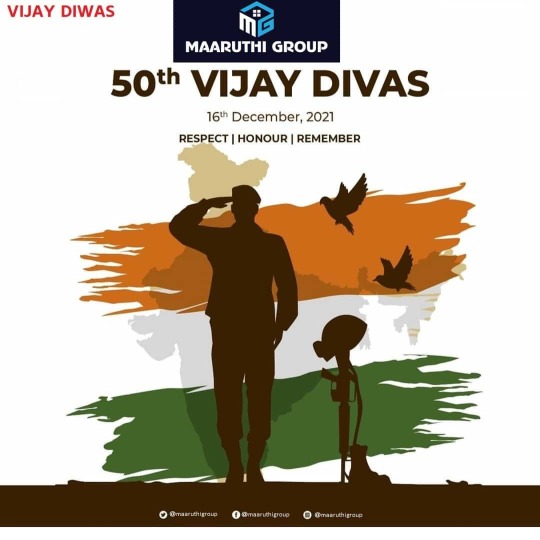
On the Golden Jubilee of #VijayDiwas2021, let us salute the courage & valour of our men in uniform who fought for the liberation of Bangladesh in 1971. In this war 93000 soldiers of Pakistan unconditionally surrendered to India. India proud its armed forces & its achievements. (at Telangana Hyderabad) https://www.instagram.com/p/CXiB-dfrOfo/?utm_medium=tumblr
0 notes
Photo
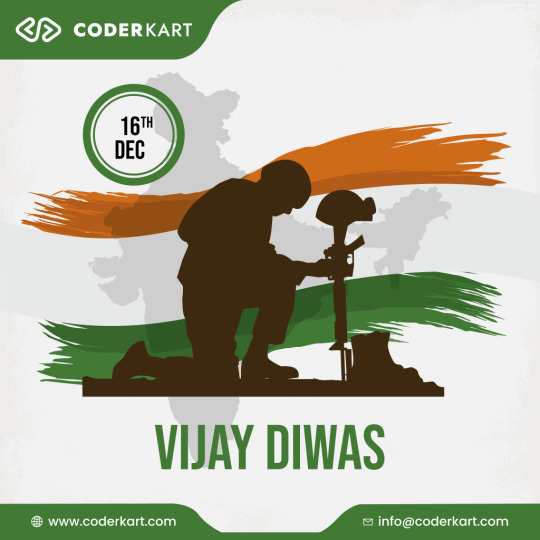
16 December 2021 marks the Golden Jubilee of the #IndianArmedForces victory over Pakistan in #LiberationWar1971. On this day, let us salute the courage & fortitude displayed by #IndianArmedForces in the 1971 Liberation War.
#VijayDiwas #Pakistan #Bangladesh #Bangladesh50 #BangladeshLiberationWar #SwarnimVijayVarsh #IndianArmy #IndianNavy #IAF #LestWeForgetIndiaFlagofIndia
1 note
·
View note
Text
President Ram Nath Kovind to visit Bangladesh on Dec 16 to attend Victory Day celebrations | India News
President Ram Nath Kovind to visit Bangladesh on Dec 16 to attend Victory Day celebrations | India News
Dhaka: President Ram Nath Kovind will travel to Dhaka on December 16 to attend the golden jubilee celebration of Bangladesh’s 1971 independence from Pakistan following a nine-month long Liberation War, officials said on Monday.
President Kovind would travel to the neighbouring country on December 16 on a two-day visit at the invitation of his Bangladesh counterpart Abdul Hamid.
“We expect the…
View On WordPress
0 notes
Text
Bangladesh Liberation War 1971: जब भारतीय सेना के जांबाज कर्नल तारा ने बचाया था शेख हसीना का परिवार
Bangladesh Liberation War 1971: जब भारतीय सेना के जांबाज कर्नल तारा ने बचाया था शेख हसीना का परिवार
Golden jubilee of 1971 war: उस दिन को याद करते हुए कर्नल अशोक तारा बताते हैं, 1971 की लड़ाई में पाकिस्तानी सेना शेख हसीना के घर को घेरे हुए थी. पाकिस्तानी लगातार घर तक पहुंचने की कोशिश करने वालों पर गोलीबारी कर रहे थे.
View On WordPress
0 notes
Text
How can India and Bangladesh enhance their golden bond for GenNext, ask Jyoti M Pathania & Shafqat Munir
How can India and Bangladesh enhance their golden bond for GenNext, ask Jyoti M Pathania & Shafqat Munir
India and Bangladesh celebrate the golden jubilee of their relationship, which is unique and organic, cemented in the battlefield during the glorious War of Liberation in 1971. This relationship has come a long way in the last half century and the people of the two nations have traversed a great distance together. As we move towards the first half-century of Indo-Bangladesh relations, it is time…
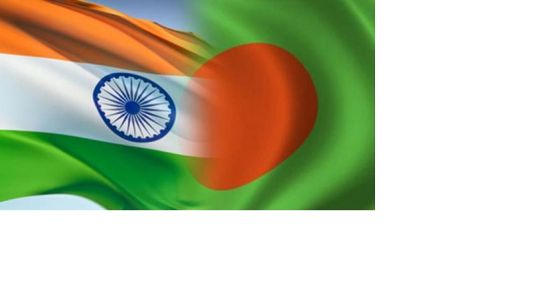
View On WordPress
0 notes
Text
Congress forms panel to mark 50 yrs of ’71 war
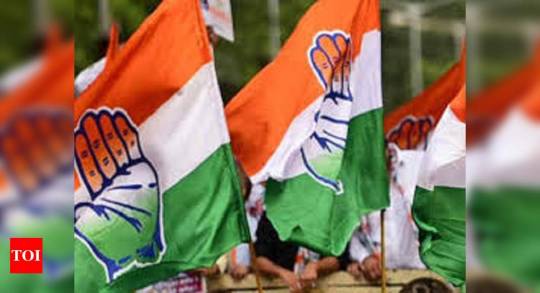
NEW DELHI: Congress on Tuesday announced a party committee to plan the commemoration of the golden jubilee of the Bangladesh liberation war with year-long programmes, the move designed to put party mascot Indira Gandhi at the heart of the debate on national security.
The panel is headed by former defence minister A K Antony and has former AICC ex-servicemen cell functionary retired Captain Pravin Davar as the convenor. The other committee members are former Speaker Meira Kumar, Punjab CM Amarinder Singh, former CM Prithviraj Chavan, MP Uttam Reddy, Jitendra Singh, Kiran Choudhry, Major Ved Prakash and Sharmistha Mukherjee.
Uttam Reddy, Jitendra Singh, Kiran Choudhry, Major Ved Prakash and Sharmistha Mukherjee. The 1971 war anniversary fell on December 16 and the delay in the announcement of the panel raised eyebrows among partymen.
source https://bbcbreakingnews.com/2020/12/30/congress-forms-panel-to-mark-50-yrs-of-71-war/
0 notes
Text
Congress mulls committee for golden jubilee celebrations of 1971 win over Pakistan
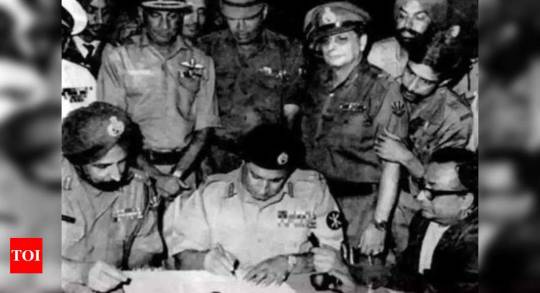
NEW DELHI: To stress the importance of the 1971 war for the liberation of Bangladesh and the leadership of Indira Gandhi during it, the Congress may form a committee for year-long celebrations of the golden jubilee of the victory over Pakistan.
Sources said Congress would observe the 50th anniversary of the war across the country through a variety of programmes culminating in December 2021.
The war between India and Pakistan concluded with the fall of Dhaka and surrender of Pakistan Army chief General Niazi with 93,000 of his troops on December 16, 1971. It marked the birth of Bangladesh as a nation and its liberation from Pakistani rule.
Senior Congress leaders, including those from the defence background, are being drafted in the panel to draw up the anniversary plan, sources said. The panel may be headed by senior leader Meira Kumar, daughter of Jagjivan Ram, who was the defence minister in 1971.
Congress is looking to project the 1971 war as an achievement of its government and the leadership, eager to contrast it with what it calls is a crisis on the national security front under the Modi government.
On Vijay divas on Wednesday, Congress lauded the leadership of late Prime Minister Indira Gandhi while also using the anniversary of Pakistan’s surrender in Bangladesh to take aim at Prime Minister Narendra Modi over the continued standoff with the Chinese forces that have intruded into India in Ladakh.
Rahul Gandhi tweeted, “In celebration of India’s historic victory over Pakistan in ’71, I greet the countrymen and salute the valor of the army. It is about a time when India’s neighbours respected the Prime Minister of India and were afraid of violating our national borders.”
source https://bbcbreakingnews.com/2020/12/16/congress-mulls-committee-for-golden-jubilee-celebrations-of-1971-win-over-pakistan/
0 notes